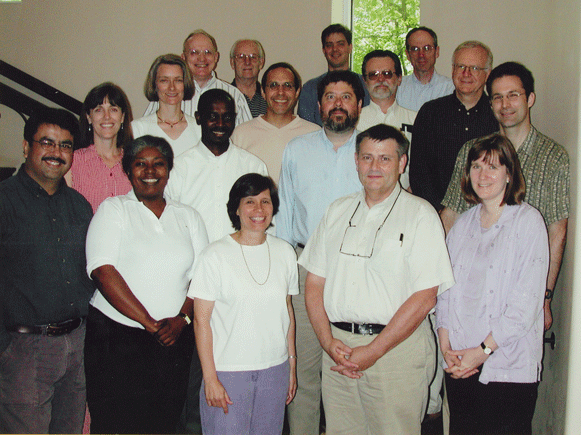2001-02 Colloquy on Teaching the History of Christianity
May 22-26, 2001- First Session at Wabash College
May 29-June 2, 2002 – Second Session at Wabash College
Mark Noll, Wheaton College
Grant Wacker, Duke University
Raymond B. Williams, Wabash Center

Front Row (left to right): Daniel Ramirez (Duke Divinity School), Anthea Butler (Princeton University), Andrea Sterk (University of Florida), *Grant Wacker (Duke Divinity School), Catherine Brekus (University of Chicago Divinity School).
Second Row: Laurie Maffly-Kipp (University of North Carolina at Chapel Hill), Jehu Hanciles (Fuller Theological Seminary), Robert Bruce Mullin (General Theological Seminary), Ronald Rittgers (Yale Divinity School).
Third Row: Dana Robert (Boston University), Arun Jones (Austin Presbyterian Theological Seminary), A. Gregg Roeber (Pennsylvania State University), David Hall (Harvard Divinity School).
Fourth Row: *Raymond Williams (Wabash Center), Robert Wilken (University of Virginia), Bruce Hindmarsh (Regent College), *Mark Noll (Wheaton College).
Not Pictured: Ann Taves (Claremont School of Theology).
* leadership/staff
The Wabash Center convened a consultation of scholars who teach the history of Christianity to discuss academic teaching and learning about the history of Christianity and to disseminate the results of the consultation in ways that will enhance teaching and learning about Christianity.
The goals focused on sharing and exploring insights that would lead to improved teaching and learning about the history of Christianity and to develop materials and resources, as determined by the group, that would be useful to other teachers and students.
Issues to Be Addressed:
- Effective classroom practices. What works and does not work in the classroom? What strategies for teaching and learning are most appropriate for teaching the history of Christianity at different levels and in different contexts? What types of syllabi work best to facilitate student learning? How are graduate assistants teach best in courses? At the consultation, we will want to consider syllabi for courses in the history of Christianity (or portions thereof) that participants have used and found effective. No special preparation is expected for the first summer consultation session. Plans and outcomes for the second summer session will emerge from group consensus at the first session.
- Scope of the task. How do we adjudicate between well-established canons of coverage and approach on the one hand and the new ways of conceiving the subject, the global expansion of Christianity, and new methods of conceptualizing and teaching the history of Christianity on the other? What do we really want our students to gain from our classrooms, both in the short and in the long-term?
- Defining the subject. What differences result in our courses, if any, from conceiving the subject as ‘church history’ or ‘religious history’ or ‘history of Christianity?’ Do the differences matter?
- New technologies. What are the potentials and the limitations in using new information technologies for teaching the history of Christianity? How can new resources be used in the classroom?
Outcomes:
The desired outcomes from the consultation are: (1) generation of ideas that will lead to improved teaching and learning about the history of Christianity and (2) development of materials and resources, as determined by the group, that will be useful to other teachers and students.